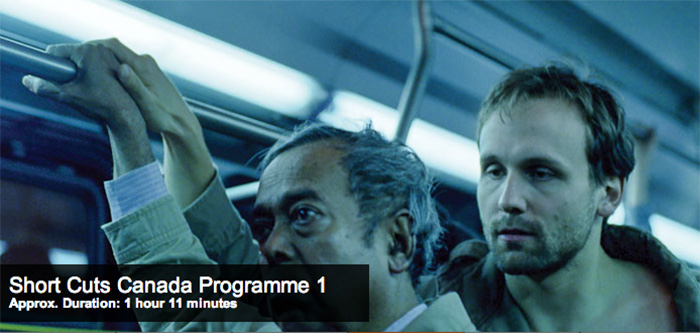
With all the buzz around world premieres and gala events happening at the Toronto International Film Festival, it’s easy to forget there is also a pretty stellar shorts program in the mix. Consisting of work spanning all genres, the format is a great way to experience new, upcoming talent as well as to check up on a couple familiar faces too. And—new this year—24 hours after their Festival premiere, films will be available to screen at YouTube.com/TIFF until September 19.
The following is a collection of capsule reviews and scores for each short in screening block 1.
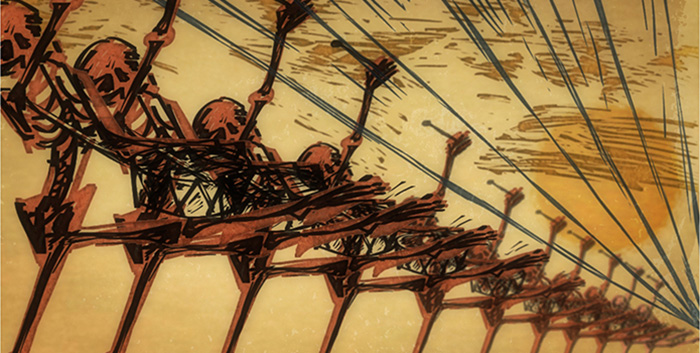
Gloria Victoria – 7 minutes
A far cry from the documentary short Joda—a visual letter to Jafar Panahi—that was included in the TIFF Short Cuts Canada Programme last year, graphic designer turned filmmaker Theodore Ushev’s Gloria Victoria is all about the visceral and aural capabilities of film without something as unnecessary as words. Full of sumptuous textured layers formed by sketch drawings, Russian Constructivist elements, what I believe were faces from Pablo Picasso’s Guernica, and more, the rising crescendo of Shostakovich’s “Invasion” from Symphony No. 7 helps spur on an emotive war in the pit of your stomach to mimic the struggle of personified shapes depicted onscreen.
The third and final piece to his 20th century trilogy that also contains Tower Bawher (2006) and Drux Flux (2008), Gloria Victoria is very much a piece of art more attuned to being received in a museum setting rather than a cinema. It’s shapes and movements project ideas of unending conflict and a construction of ill-will on the backs of promises for peace—a cycle we’ve seen go on and on for centuries with only an escalation in damage being left as a byproduct. It will get your blood pumping and stir something within, uncaring about those in the audience waiting for a narrative beyond the one created from the feelings its artistry coaxes out.
B
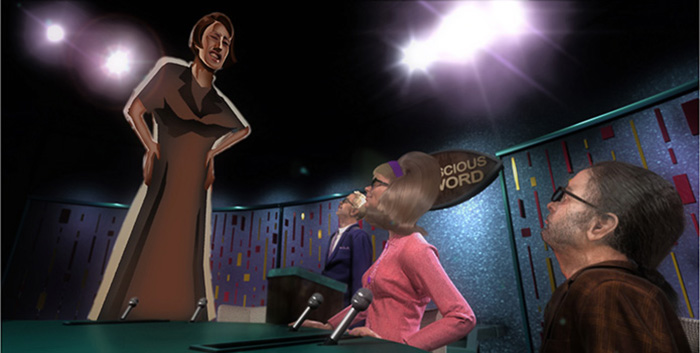
Subconscious Password – 11 minutes
That moment when someone you recognize—someone you spent a good deal of time with getting to know—comes over with a huge grin to engage you in conversation and yet you have no clue what his name is? This is what Oscar-winning director (2004 Animated Short Film for Ryan) Chris Landreth has brought to life in the aptly named Subconscious Password, a surrealistically internalized homage to the game show Password on behalf of his character Charles.
Desperate to figure out this acquaintance’s identity (animator John Dilworth playing himself) before he returns from the bar, Charles goes deep into his hippocampus for any clue that may reveal the answer. His ego (Don McKellar) hosts as his subconscious plays against his id with the same password—John—hinted at by a slew of celebrity guests like Yoko Ono, Dick Van Dyke, Ayn Rand, and James Joyce. Wrong answers abound as new characters are brought in as Charles eventually regresses to a crying baby unable to live with the awkward situation about to commence.
With off-kilter animation that hybridizes computer effects, archival footage, collage, and 2D cartoon, Landreth’s style is uniquely his own in its unpolished yet boldly artistic way. A funny situational comedy we can all relate to—especially the moment where the answer hits halfway through in such a kneejerk reactionary way that he doesn’t even realize it happened—the fast-paced short is a delight if not wholly substantive above gimmick status. Relevant and chicly cool, however, the oddity of its aesthetic renders it a must-see for all fans of the medium.
B
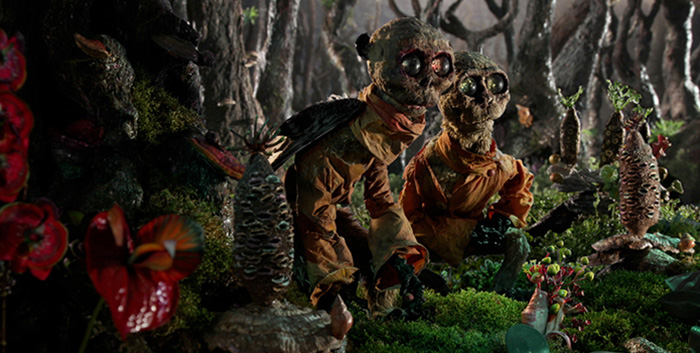
COCHEMARE – 12 minutes
I think creators Chris Lavis and Maciek Szczerbowski’s subtitle for their film Cochemare says it all: “A study in mytho-erotic mania and isolation”. They follow that up by stating how the piece will “[force] us to confront our notions of voyeurism, femininity, and the separation of body and mind”. Yeah, that sounds about right.
Beginning with a fully nude succubus (Victoria Diamond in inverted color) as she walks through the mystical Forest of Storms, we’re made to watch as flying green creatures that would fit in perfectly with the world of Jim Henson’s The Dark Crystal approach her to feed on a fluid released from her mouth. There are snails everywhere crawling around an intricate reef of manufactured forestry surrounding her, filmed with a longing eye towards their subtle movements and softly sensitive exteriors.
From here roles are reversed as a creature now feeds a sleeping, prone astronaut aboard the International Space Station (Diamond again), exposing her body before the sequence can evolves into a one of self-pleasure. Aesthetically utilized reflections, inversions, viscous materials, and the female form all mix together in a live action/stop-motion puppetry blend that can’t help but leave you in a state of discomforting arousal due to the intimacy and eccentricity of what transpires. Good or bad—it’s all in the eye of the beholder. Strange and obtuse—I think that’s kind of the point.
B-

The Sparkling River – 18 minutes
The Sparkling River is a strange little science fiction film, subtle and nuanced in its depiction of memory and place. Directors Félix Lajeunesse and Paul Raphaël don’t show us how a group of Chinese travelers to Frankfurt end up on a rural alpaca farm nor how they eventually leave, but the sound effects of their tools and airline-esque verbiage definitely don’t make it difficult to guess some sort of futuristic wormhole is in play. And while their stay is very brief—lasting as long as it takes to fix the transportation device stranding them in this foreign place—none of those involved will ever forget the detour.
The farm’s owner (Jesse Zubot) has no clue as to what’s going on, but he never seems fazed by what transpires. Even when he admits he’s never experienced something as crazy as having so many strangers arrive out of nowhere, it’s more a statement of fact than a sense of awe. The unannounced event will stick with him as Debbie Wong’s friendly tourist—the only person willing to engage their new host because it’s an unexpected adventure thrust upon them without warning. And through a voiceover narration as poetic as it is informative from a woman we can assume is Wong years later, we learn this place will be visited again.
Memory in itself during this unknown period of time has become more than just fleeting images lost as time goes by. We see one of the travelers not only close his eyes to share a butterfly he saw years earlier with his fellow technician but offers to let her keep it in her own brain’s database for future reference of its beauty. Even though such recollections can be conjured at will, however, there’s still something desirable about a tangible item kept in one’s possession to mark moments in time. And whether it’s with a cigarette to be smoked at a later date or a gift with its own unique distinctions, this place that was once singularly known and unknown transforms into a communal instance shared by strangers now forever linked.
B+
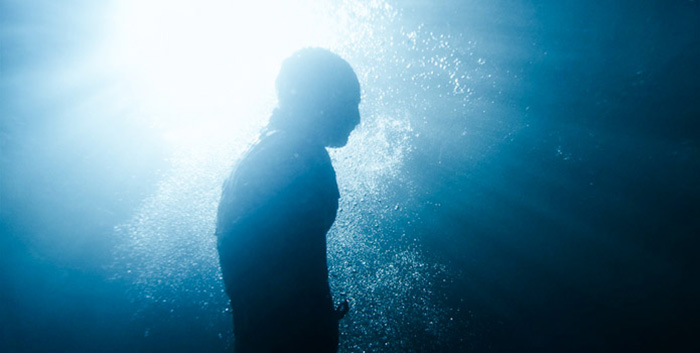
Pilgrims – 8 minutes
A series of images cross-cutting through reality and dream, Marie Clements’ Pilgrims shows how our personal histories can never be forgotten no matter how much time has passed. This is especially true for a Native American culture all but wiped out and segregated onto reservations their white settlers “gifted” back after taking everything else. And as far as the Germans go, well I’m not sure they’ll ever—nor should they—live down the travesty of genocide during World War II. When these two meet, however, does the past or present prevail?
The answer isn’t an easy one as you progress towards the end of this film. We watch as Bradley Stryker’s tourist visiting Canada’s western coast attempts to spark conversation with local Asshole (Lorne Cardinal) by speaking about his love for all living creatures, including the seals seen in the distance. To the Natives, however, seals designate a selfish being that would rather consume everything in its path than let it linger to be taken by something else—a not too subtle metaphor if ever there was one. And as a White Man and German, Stryker’s heritage definitely fits the bill.
What comes next is a fever dream of psychological fears or unfortunate luck as Asshole and friend Stiff (Kevin Loring) take Stryker to see Driver (Niall McNeil), a man with the means and propensity to make people disappear. Covered head to toe in black duct tape, the foreign visitor is dropped into the water to his death, drowning for the sins of his people and revenge for the victims of their slaughter. Is it real or a manifestation in his head during the impossible seconds that tick away underwater after falling; hoping someone will jump in a save him? Well, that one’s up to you.
A-
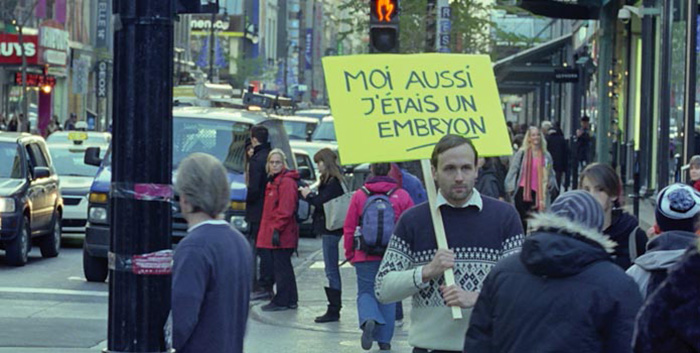
Mémorable moi [Remember Me] – 15 minutes
Any adulterers out there looking for a good excuse to use when your significant others find out the truth? I don’t have one for you—you’re a horrible person, stop it. That said, what if there was a condition where you’d disappear if no one were thinking about you? What if you needed to go around town making people fall in love with you if only to ensure someone will have you on his/her mind when the rest are onto other things? You can’t expect your boyfriend/girlfriend to do the job 24/7, that’s plain irresponsible. Spread those duties internationally through social media and bask in the warmth of knowing you’ve retained corporeal form thanks to a bunch of strangers currently loving, hating, and laughing at you.
This is the crux to Jean-François Asselin’s hysterical social satire Mémorable moi [Remember Me]. It introduces us to Mathieu (Émile Proulx-Cloutier) as he’s making out with a woman in a dark alley before heading home. A glutton for attention, he also moons a restaurant full of people, tries to hold a guy’s hand on the subway, and obnoxiously scats noises into the ear of a woman minding her own business. He’s streaked tennis matches, had sex with whomever was willing, and performed his own sort of Jackass videos for the web—anything and everything to stop himself from feeling invisible like when Isabelle (Eugénie Beaudry) dumped him years before.
Unable to keep the secret from his current girlfriend Sophie (Sylvie De Morais-Nogueira) any longer, the truth arrives in a rousing montage of idiocy, torture, and cruelty where the most despicable things garner the biggest laughs as she cries uncontrollably in response. His actions are a gross-exaggeration of our own daily ritual of putting every second of our lives online for the world to see. You will chuckle at your own ego yearning for attention while watching this, knowing the lengths you’ve gone are nowhere near Mathieu’s but still just as self-serving. And when you think things can’t get worse than starving Africans leafing through photos of their “sponsor” throwing out perfectly good food, Asselin escalates things to a bloody finale I kind of feel guilty about finding hilarious.
A
Short Cuts Canada Programme 1 played at the Toronto International Film Festival on September 7th & 8th.

